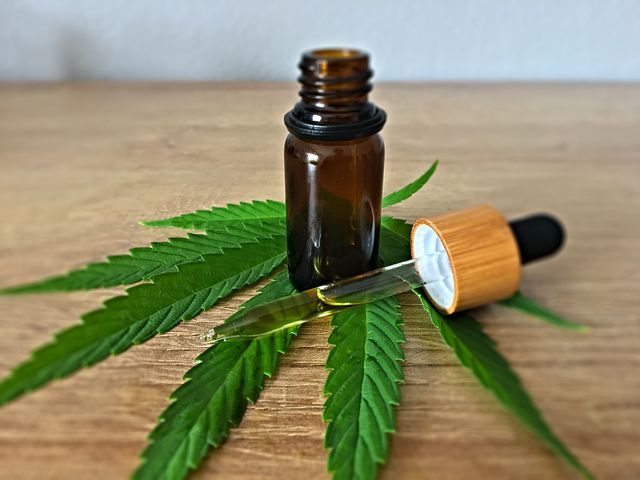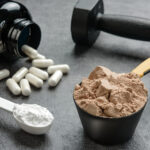Can CBD Oil Cause Headache?
Given the evidence-based therapeutic benefits of CBD oil, “CBD-induced headaches” may sound like an oxymoron. However, there’s been a long-lived debate that CBD causes headaches.
What fuels this argument? Do you truly get headaches because of CBD consumption? Read on to learn the truth!

What Does CBD Refer To?
CBD, or cannabidiol, is a naturally-occurring chemical found in hemp or marijuana plants. The compound is federally legal when sourced from hemp plants with less than 0.3% THC. While CBD belongs to the buzzy marijuana family, it doesn’t get you high.
Typically, CBD interacts with the endocannabinoid system of the human body. Leveraging endocannabinoid modulation, CBD impacts the vast biological network of endocannabinoids.
The CBD revolution started in 2014, and after the debated 2018 Farm Bill, this buzzy component has taken the wellness world by storm.
Several studies suggest that CBD may help alleviate anxiety, depression, inflammation, and a few other conditions. In fact, CBD is used in prescription drugs that help with epilepsy-derived seizures.
CBD Oil – The Types
CBD oil may have several variations depending on the type of hemp extract present. They include broad-spectrum, full-spectrum, and CBD isolates. Broad-spectrum CBD oil comes with many other essential cannabinoids except for THC. Full-spectrum CBD, on the other hand, packs all the cannabinoids, including flavonoids, terpenes, and THC. CBD isolate, however, features 100% CBD with other constituents removed.
Does CBD Oil Cause Headaches?
CBD oils and headaches don’t share any outward connection. In fact, no research supports the link between these two. However, anecdotal evidence suggests that CBD consumption may cause infrequent side effects like headaches.
Does Scientific Literature Support This Claim?
Put simply, no! A 2017 clinical review says that headaches are one of the rarest side effects of CBD. However, the debate doesn’t end here; there’s more in the story.
When Does CBD Oil Cause Headaches?
If studies have found CBD oil innocent, what triggers the claim? Well, CBD oil users may throw up headaches as a side effect if they consume the product inappropriately.
The possible causes of CBD oil-induced headaches may include the following.
Improper Dosage
A 2017 review of research says humans can safely tolerate up to 1500 mg of CBD per day. Typically, a one-ounce bottle of CBD oil packs 300-1500 mg of CBD.
Ideally, you shouldn’t develop bad headaches even if you consume one whole ounce of CBD oil in a day. However, if you exceed the recommended 1500 mg threshold, you may suffer side effects.
Typically, beginners are more likely to develop headaches and nausea after heavily overdosing on CBD. Therefore, if you have just started with CBD, you should consume the substance sensibly. Always follow the manufacturer’s guidelines.
Remember, it may take some time to determine the sweet spot dose when you start small. However, gulping insane dosages may make things foggier.
Hence, start with small doses and monitor how your body responds to the substance. You can gradually increase your CBD intake to obtain the best results.
Quality
Low-quality CBD oil may lead to CBD headaches. Impurity or inferiority may be the villain. Besides headaches, they may also trigger unwanted health hazards like nausea, dizziness, low blood pressure, etc. Therefore, always use organic CBD oil extracted from federally compliant hemp plants.
Consider Associated Factors
If you get a headache after taking CBD oil, the tincture may not be the problem. Other factors like stress, sleep deprivation, dehydration, and caffeine withdrawal may also trigger bad headaches. Thus, consider all the factors to determine the rationale before correlating your headache with CBD use.
However, if you get headaches every time you consume a specific CBD product, you may need to exercise a little caution. Probably, your product is causing the problem, not CBD. You may try CBD oil from other brands and monitor the effects.
How to Avoid CBD Headaches
Instead of blaming CBD for undefined headaches, you should take a few extra steps to limit the risks. This will eventually help you enjoy a comforting CBD experience.
Purchase High-Quality Oil
Always buy pure and unadulterated CBD oil. Avoid products that include thinners, additives, diluents, or cutting agents. These substances suppress the benefits of CBD.
Furthermore, they increase the risk of headaches. Typically, high-quality CBD oils are infused with supercritical CO2-extracted hemp. Sometimes, they may pack carrier oil.
These ingredients are less likely to trigger headaches. However, some CBD products may contain other plant extracts. While they are not harmful, they may also contribute to unexpected headaches.
Buy Lab-Tested Products
Betting on independent lab-tested CBD products allows you to keep impurities at bay. Unfortunately, the CBD industry is still very much unregulated.
Several fraudsters use this loophole to market low-quality, fake, and dangerous products. This is where independent lab testing comes into play.
Every reputed and trusted manufacturer sends their products for unbiased lab testing. In addition, they make the report available on their official website. Naturally, this allows you to cross-verify the safety and reliability of the product.
While going through the third-party reports, you should carefully check the total CBD content in your tincture. Besides, you should ensure your product contains less than 0.3% THC.
Furthermore, your product should be free from chemical residues, mycotoxins, mold, bacteria, and other health-damaging stuff. Most importantly, the lab testing report should clearly mention the tested product and date.
Sleep Well and Stay Hydrated
Lack of sleep and dehydration may cause severe headaches. Thus, drink loads of fluid. In addition, maintain a good sleep routine. Anything less than seven hours of uninterrupted sleep may cause dizziness, headaches, and other side effects.
Avoid Blending CBD With Other Substances
Mixing CBD oil with alcohol, prescription drugs, and other substances may lead to fatal side effects. Besides pounding headaches, you may get blackouts, severe nausea, seizures, etc.
Remember, CBD may interfere with several prescription drugs. Moreover, it may neutralize the enzymes responsible for removing drugs from your system.
When your body fails to flush out medication properly, the concentration of the drug increases. Consequently, you experience worsened side effects of that specific drug. Given this, you should avoid taking CBD oils with other drugs, alcohol, etc.
Avoid Vaping
Though vaping has emerged as a fancy mode of CBD use, it may cause headaches. It’s worth keeping in mind that CBD oil is ideal for sublingual administration, oral intake, or tropical application. If you want to vape your stuff, you should invest in liquids, disposable vape pens, or cartridges.
Can CBD Alleviate Headaches?
Now that you know CBD may cause occasional headaches, what about its popular pain-alleviating properties? CBD oil may help reduce headaches, and several studies support this claim.
A renowned journal (2021) published literature that shows that medical marijuana can significantly alleviate migraine-related discomforts.
Understanding Clinical Efficiency of Endocannabinoids
Cannabis researchers have proposed a theory to explain CBD’s effect in relieving migraines. According to the said study, irritable syndrome, migraines, and fibromyalgia occur because of clinical endocannabinoid deficiency.
Usually, migraineurs lack the optimal levels of the vital endocannabinoid in their cerebral fluid compared to non-migraineurs.
The said endocannabinoid anandamide binds with the CB receptors in the human brain. Therefore, any deficiency may lead to serious dysregulation. Surprisingly, CBD helps block the anandamide reuptake.
Naturally, this facilitates the storage of endocannabinoids, reducing the risk of deficiency. The theory is highly feasible, and several journal citations have made it more trusted.
CBD for Unexplained Headaches
CBD can probably help relieve unexplained headaches. However, more detailed research is required to prove CBD’s effectiveness as a headache reliever.
Most studies recommend the blend of THC and CBD for headaches. Therefore, it’s hard to bet on the fact that CBD can independently work better on headaches.
What’s Good About CBD
CBD’s medicinal benefits are widely popular. When consumed rightly, CBD may offer a slew of advantages. They include the following:
Relieves Chronic Pain
Surprisingly, the ancient civilization was aware of CBD’s efficiency in pain relief. Since 2900 BC, the substance has been serving mankind as a pain remedy. Several studies support CBD’s ability to combat unexplained pains, tension headaches, and inflammation.
Combats Anxiety
CBD may help reduce anxiety and boost mood by stimulating dopamine and serotonin – the happiness-inducing hormones
Alleviate Chemotherapy Side Effects
CBD, in any form (topicals, tinctures, edibles, etc.), may help reduce chemotherapy-induced nausea, pain, and vomiting. CBD probably interacts with the interoceptive insular cortex (IIC), the brain region that triggers the sense of nausea.
Besides nausea, CBD may also help with other side effects of chemotherapy, including organ toxicity, loss of appetite, etc.
Depression and PTSD Reduction
According to new research, CBD may exhibit an antistress effect in long-term use. Furthermore, CBD may reduce the symptoms of post-traumatic stress disorder. It may help combat issues like nightmares and interrupted sleep. However, more studies are required to produce conclusive evidence of these claims.
CBD Side Effects and Risks
CBD is considered safe but may exhibit alleged side effects if you consume it insensibly. These risks and side effects may include the following:
- Interaction with other prescription drugs
- Altered alertness
- Loss of appetite
- Liver malfunction
- Diarrhea
- Sleep disorders
- Sedations
- Drowsiness
However, what dosage of CBD can trigger the risks mentioned above is yet unknown. Besides, CBD’s effect on developing fetuses and breastfeeding babies remains unexplained.
Therefore, always follow the manufacturer’s provided dosage recommendations when consuming CBD. Moreover, avoid the substance or see your doctor when you plan on consuming CBD during pregnancy or lactation.
FAQs Regarding CBD
Can CBD Overdosing Cause Emergencies?
CBD hardly causes long-lasting and deadly side effects. However, recklessly ingesting CBD oil or other CBD products may have serious consequences. You may need to visit your nearest emergency room for unconsciousness, obstructed breathing, and unexplained seizures.
Given this, it’s crucial to consume the substance sensibly. In addition, you should always use high-quality, lab-tested CBD to avoid unwanted complications.
Do CBD edibles cause headaches?
CBD edibles may or may not cause headaches, depending on their ingredients. Like CBD oils, edibles that pack poor-quality CBD and other impurities may cause headaches. However, when you invest in premium quality edibles and consume them sensibly, you hardly experience headaches.
What do the effects of CBD feel like?
CBD’s effects are usually subtle. The substance is non-psychoactive, ensuring zero high. However, it may render a slightly fuzzy sensation. The rejuvenating effects of CBD can make you feel lighter and more relaxed. The higher the dose of CBD, the more prominent these effects will be.
Some consumers claim that CBD activates an autopilot sensation. You may feel that your body is responding automatically without demanding much consciousness. However, you can still enjoy full control over your mind and body. Your mental state doesn’t get foggy; extremely high doses may make you feel sleepy, though.
Where does CBD come from?
CBD typically comes from hemp plants – a CBD-dominant species of cannabis plants. Hemp plants typically contain more CBD than THC. Legit CBD products from hemp plants contain less than 0.3% THC. These products are federally legal. FDA hasn’t approved non-prescription CBD products, but they oversee the production methods to ensure safety and reliability.
Has CBD undergone clinical trials?
In recent years, CBD has become a popular area of medical study for good reasons. This non-psychoactive compound is thought to be effective in combating various medical conditions. CBD-based treatments are considered highly effective and safe for epilepsy.
Several studies are trying to determine CBD’s efficacy in combating psoriasis, Parkinson’s, multiple sclerosis, and cancer cell growth. CBD has recently stepped into the medical mainstream, and researchers are dedicatedly exploring numerous unanswered questions related to this buzzy substance. More longitudinal studies are required to establish CBD’s effect on the brain and its ability to improve the quality of life.
Wrapping Up
To conclude, CBD is a beneficial substance with potential therapeutic abilities. Several medical discoveries highlight CBD’s effectiveness in treating different conditions and discomforts. The substance can be refined to be very mild or very potent. Besides, you can introduce it to your body in a whole spectrum of ways.
However, overdosing or improper consumption of CBD may lead to a few side effects, including headaches. Moreover, subpar-quality products may do more harm than good.
Therefore, purchase CBD oil and other CBD-infused products carefully. Always count on a legit and reputed manufacturer. In addition, check third-party lab test reports to determine the safety and efficiency of your chosen product.





